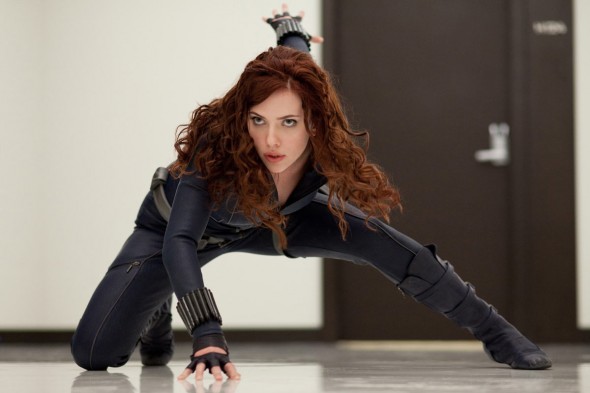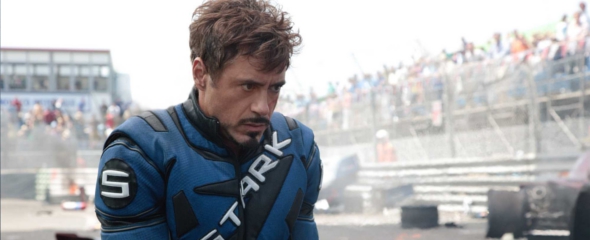In the summer of 2008, Hollywood raised the bar for the modern superhero film. With The Dark Knight, audiences discovered that a superhero yarn could spin itself in the utmost seriousness and still be immensely enjoyable, while a film like Iron Man could be equally enjoyable, and also know when to relax here and there. It is the latter’s ability to chill out that makes it more accessible, and – I dare say – more watchable time and time again. The mood of the film mirrored it’s hero: It knew it had a calling – a duty – to do, but it did that job on it’s own terms, never shying away from a lush sarcasm that always hit its mark. Jon Favreau gave both comic book fans and the general movie-going public effortlessly enjoyable characters and a lean story that was such an easy meal to swallow, it left them with sated appetites begging for seconds.
Now, a rather fast two years after the smashing success enjoyed by Favreau and company, audiences have gotten their second entree in Iron Man 2 – and while it certainly has more fat on it than its predecessor, its seasoning is just as savory, its portions just as filling. The game, as is the case with sequels, has changed, and the characters who once relished in levity have changed with it. After a grim introduction of the capable (although underused) Mickey Rourke as Russian genius and ex-con Ivan Vanko (a.k.a. Whiplash), the viewer is brought back to the Tony Stark they left at the first film’s end, the man who basked in celebrity with the declaration “I am Iron Man.” However, now Robert Downey Jr.‘s gait is slightly more burdened, as if, despite hauling around a huge metal suit, the largest weight on his shoulders is his own ego. He retains all of the wit and charm that the have come to expect and adore, but behind closed doors he fights an uphill battle at the cost of his own health, standing shakily on the Iron Man pedestal he placed himself upon. Although playing a slightly different Stark, Downey holds the part together and keeps enough wry humor in play to never let things get too serious. The character still maintains a consistency that makes it easy to follow him into those dark corners when they come around.
Still accompanying Tony on these highs and lows are Pepper Potts (Gwyneth Paltrow) and James Rhodes (Don Cheadle, filling in for Terrence Howard). As Tony changes, so do they, and in the same fashion: Paltrow’s rapport with Downey is one-part nagging wife and two-parts babysitter, with the fun and flirty chemistry becoming something of a garnish. The chemistry with newcomer Cheadle also feels stilted, and some might argue that it comes across as bored. Even still, Cheadle is certainly better suited for Rhodes than Howard was. He keeps the consummate professionalism and patriotism of the role, while implementing a more convincing grit when it comes time to throw down. Cheadle plays harder where Howard would have played too soft. These performances do leave one pondering: are Tony Stark’s squeeze and best friend acting this way because of shoddy and uneven storytelling, or is it simply because Tony himself has raised the stakes to alienate them?
Among the stakes raised is the appearance of new foils and foes, which leads one to believe that, between Pepper and Rhodes chastising his cavalier behavior and the United States government wanting a piece of the Iron Man pie, Tony Stark is on his own side and doesn’t even know it. Worsening Tony’s already dire circumstance is the government’s contracted industrialist Justin Hammer (played to perfection by the always awesome and scene-stealing Sam Rockwell), who seems bent on unraveling Stark Industries out of a massive inferiority complex in the wake of Tony’s gallant efforts as Iron Man. Rockwell hits all his notes in key. He gives Hammer a smarmy and ugly nature, while still laying on just enough suavity and charm to make every scene he’s in something to look forward to. His scenes with Rourke are particularly high points. As he lets is forked tongue run wild, Rourke counters it in kind with glances, glints and conniving smirks. Rourke, as said, is underused, and his scenes are punctuated by very little on his part. On one hand this leaves us wanting more, and on the other, it compliments his relationship with Hammer, who underestimates him consistently. In spite of his understatement, when Rourke makes a point of being noticed, he stops the show, clinching some of the film’s better – albeit brief – parts (note the raceway and prison scenes as proof).

Although the expanding world of Iron Man’s universe still manages to captivate and entertain, the trouble in paradise arrives when worlds collide, with Samuel L. Jackson‘s Nick Fury and Scarlett Johansson‘s Black Widow entering the fray. The scenes with Fury do not – at any point – feel like they belong in this film. Each one seems like a deleted scene from a special features menu, or a scene better left to the forthcoming Avengers film. Jackson’s performance is easily the weakest in the film, but with lines like “I’ve got my eye on you,” one can’t help but think it wasn’t entirely his fault. As for Johansson, she plays the sexy, stoic yet deadly Black Widow well enough, but ultimately doesn’t add much more to the overall picture than some gorgeous eye candy and a really (really) sweet fight scene.
Aside from what feels like these two (near) irrelevant character additions, the film’s pacing is strikingly uneven. Between a handful of brilliantly-crafted action scenes, it takes the time to muse on themes of strained father/son relationships, what it means to have a legacy and what the cost of that legacy is when dealing with personal friendships and desired romances. Tony Stark looks at his own life and is forced to reconcile actual responsibility toward those around him amid the facade of celebrity heroism. The major chink in the chain is that director Favreau and scribe Justin Theroux promise insightful introspection on these themes without ever actually delivering, as if their characters stare at an abyss without ever actually entering it. The effort is certainly appreciated, but the follow through is absent for fear of getting too serious, and the film slows down. Give us your musings Iron Man 2, but commit to them, or else leave them at the door (it worked for part one).
In the face of unsteady pace and one or two ill-placed characters, this sequel still shines. It may not be the grand slam of a follow-up that fans of Iron Man were hoping for, but it is still a sequel worthy of its franchise. In making an effort to mix things up, it opens the door to a tone that some may have not expected, but in so doing keeps its viewers sharp, awaiting the next move. Waiter, we’ve finished our meal. What’s for dessert? Oh why yes, Iron Man 3 sounds delightful.
7.5 out of 10


